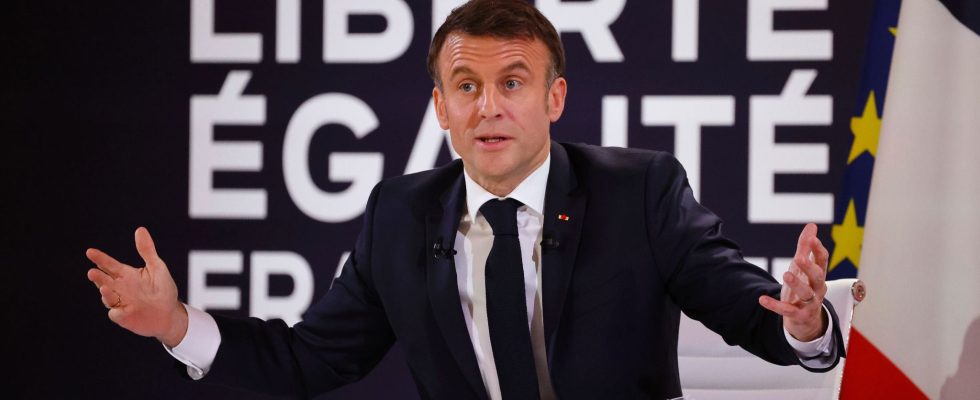Emmanuel Macron rarely wears a beard. Apart from this detail, his announcements about the school, during his press conference on Tuesday, January 16, resembled an ardent speech from one of the leaders of the Third Republic. Jules Ferry, founder of compulsory, free and secular schooling, for example. Symbol of this marked return to republican tradition, the experiment with compulsory uniforms in public schools, announced in around a hundred establishments. “The uniform erases inequalities between families and creates conditions of respect,” justified the President of the Republic.
Contrary to popular belief, uniform has never been compulsory for everyone at school. However, its development remains associated with the Third Republic and the democratization of school education. The wearing of blouses then became widespread, particularly so that the ink from the feathers did not stain the clothes. Standardized clothing does not completely erase inequalities, since the rich wear beautiful fabrics while the workers often use mended fabrics; on the other hand, it evokes a period during which inequalities are drastically reduced.
The law of March 28, 1882, brought by Jules Ferry, then Minister of Civic Education, also made military exercises compulsory at school. These “school battalions” wear uniforms. In high schools, the wearing of a military-style uniform is widespread and it is this spirit of “respect” and distinction that justifies it.
“Masters” and “instruction”
Like Tom Thumb and his stones, Emmanuel Macron sprinkled his press conference with other references to the fundamentals of the Third Republic. A project for the school refocused around national cohesion and belonging to the Nation is emerging more and more clearly. The “black hussars”, as the teachers of the end of the 19th century were called – Emmanuel Macron chose the word “masters” to designate the teachers -, rather than pedagogism, this educational philosophy resulting from the “education” movement new”, which appeared after 1968, placing the individual emancipation of students above any other value, we could summarize in broad strokes. “Each generation of French people must learn what the Republic means: its history, its rights, its duties, its language, its imagination, and this from childhood,” pleaded the head of state.
The doubling of the hours of civic education from the fifth grade, “with support from the founding texts of the Nation”, says Emmanuel Macron, is obviously part of this logic. Once again, the choice of words is important: the president mentions “education”, as they said under the Third Republic, rather than civic “education”. When the Head of State says he is “totally in favor” of the systematic learning of La Marseillaise in primary school – theoretically already compulsory since the Fillon law of April 23, 2005 – we think we are hearing Jules Ferry himself. The pioneer of compulsory schooling wanted to instill fervent patriotism in young French people, in the context of the humiliation caused by the Franco-Prussian War of 1870-1871. “The Prussian teacher has brought about the victory of his homeland, the teacher of the Republic will prepare revenge,” declared the minister in Reims in 1882.
A nod to “certif”
As for the Brevet and Baccalaureate graduation ceremony that Emmanuel Macron wishes to generalize from this year (it already exists in many municipalities), it once again echoes a tradition of the Third Republic. From 1882, obtaining the certificate of primary studies – the famous “certif” gave rise to ceremonies in each canton, where diplomas were awarded and where the first ones were awarded prizes. Another nod to Jules Ferry’s “certificate”, presented at the age of 11, a standardized national assessment will now be compulsory for CM1 students, announced Gabriel Attal, in August 2023.
Even the announcement of compulsory teaching of the history of art and the practice of theater in schools can be part of this “black hussar” lineage. “As with music and the visual arts, I hope that theater will become a compulsory part of middle school from the next school year,” explained Emmanuel Macron. However, it was once again Jules Ferry who made drawing and music compulsory at school, in 1882. The idea was to develop the students’ aesthetic sense. “The aims of Jules Ferry? To give a modest but broad culture to the children of the people, to cultivate patriotism thanks to well-chosen words”, explains the historian Michèle Alten, author of Music in school: from Jules Ferry to the present day. Jules Ferry was also Minister of Civic Education but also of Fine Arts. This link between artistic sense and patriotism, Emmanuel Macron affirms it in turn, explaining that he promotes art history courses “because France is also a history, a heritage which is transmitted and which unites”.
This time, the reform is able to reconcile, it seems, the followers of tradition and the defenders of “new education”: learning theater must allow students to assert themselves and gain confidence in them. “It gives confidence. It teaches orality, contact with major texts,” defended Emmanuel Macron.
All of these educational announcements also have one thing in common: they cost very little. As if in a tense budgetary context, while teachers obtained salary increases in 2023, the President of the Republic had this time decided to “do better with less”. The teaching unions are also ironic this Wednesday, January 17 about these reforms, which in themselves will not address the lack of attractiveness of the profession. “Unless I am mistaken, the uniform does not bring back a replacement teacher,” notes for example Sophie Vénétitay, general secretary of the SNES-FSU, to the World.
.
